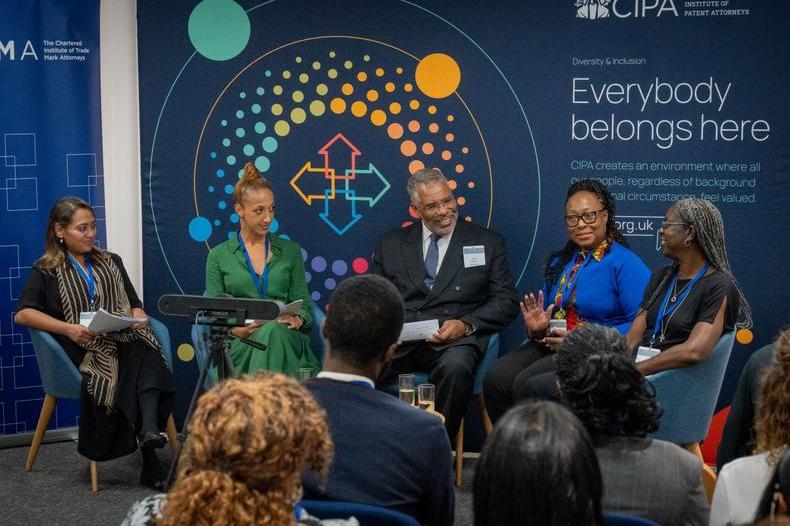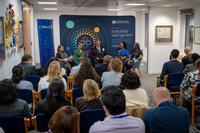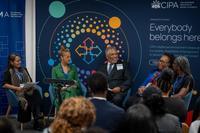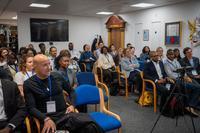Celebrating Black excellence in IP
Dive into the lived experiences of four Black IP professionals, as they reflect on the value in allyship, building resilience, and practical guidance for the next generation.

In celebration of Black History Month, we teamed up with CIPA for a thought-provoking panel discussion, bringing together leading voices in IP – Ese Akpogheneta (BAT), Dr Rachel Daniel (IP21), Gifty Gakpetor (IP Together), and Anita Shaw (Caldwell) – and chaired by James St. Ville KC.
Crucial support systems and allyship

While each of the panellists took a different pathway to get to where they are today, mentorship and the support of others around them proved transformative throughout their careers.
Gifty, a Chartered Trade Mark Attorney and founder of IP Together Limited, credited individuals like the late David Lutkin (former ITMA President) and Barbara Cookson (Chartered Trade Mark Attorney) with opening doors in her career.
She recalled, “David Lutkin gave me a solid foundation on how to manage foreign trade mark portfolios, which enabled me to pass my exams for that aspect of my qualification. Because of this, three months into my role at Field Fisher Waterhouse, I was made head of the Foreign Trade Mark portfolio there.”
However, knowing Gifty wanted to fully qualify, Barbara would often take Gifty to hearings, exposing her to “what we used to call CTM, Community trade marks, and the UK law aspect.”
Ese currently works as Trade Mark and Marketing Counsel at BAT, but her journey began with a clerical temping position at the UK IPO. She explained how the early exposure to hearings and formalities work sparked a passion in her to progress further in the industry.
Reflecting on a role she covered during her time working at an international firm, she was keen to emphasise the power of advocacy, “What I would say is I had allies when I didn’t realise I had allies,” adding, “I remember the frosty reception I got from the person I was reporting to, he didn't want a black woman, and he didn't want somebody who wasn't a graduate.”
However, a general counsel at the firm championed Ese’s abilities and she went on to perform well in the role, witnessing a shift in the relationship.
Anita, a Chartered Patent Attorney and co-founder of the IP & ME community, emphasised the importance of leaning on others and seeking support when needed, “You don't have to do this on your own and it does take a village. Whether you're a Trade Mark Attorney or a Patent Attorney, this is a tough route.”
She added, “When I was training there wasn’t really the advice around mental health and stress relief, but now there’s so much more awareness of the bigger issues.” Moving on to explain the creation of IP & ME, she urged attendees to follow these groups and ask for further information.
Overcoming challenges and building resilience

While celebrating their achievements, the panel shared experiences that highlighted both how far the profession has come and the resilience they have built over time.
Gifty spoke candidly about rejection early in her career, including being told after one interview that she "wouldn't fit in" because she was black. Her response embodies the spirit of the evening, "You have to let it go through one ear and come out the other. Here I am, running a very successful IP practice, which will be 10 next year.”
The message resonated deeply with the rest of the panel, with Ese echoing similar sentiment, “You can’t let it be personal. You have to be resilient. There are people who are going to be your allies, but there's also going to be naysayers. Just don't let it bring you down.”
Rachel, a Patent Attorney with a background rich in academic cancer research, offered powerful advice for managing the psychological aspects of being underrepresented. "I think my default is to assume you'll be accepted," she said, “Because worrying about not being accepted is as bad as someone not accepting you in terms of how it would maybe hold you back.”
She added, “Have confidence, assume the best in people until they give you some reason not to. Go in with the belief that there are more people accepting of me than there are less.”
The panellists also agreed that the profession has evolved significantly. Looking back to when she entered the field in 1995, Gifty noted, "I could actually count how many of us were black. Clearly, there's been progress."
This progress drives their continued involvement, with Ese stating, “When I started, there were not people like me ahead of us to go and talk to and say, ‘how do I navigate this?’ That's why I sit on CITMA Council, that's why I do IP Inclusive – I want the younger people coming up to see me.”
Insightful advice to take home with you

The evening’s discussion concluded with practical guidance for the next generation of IP professionals.
On finding mentors, the panel encouraged proactive engagement. "I have people contacting me on LinkedIn all the time, and I do schedule Zoom meetings to encourage you and give you direction," Gifty shared. "These are avenues which we didn't have in our days."
They also highlighted valuable resources that would help with this, including CITMA’s award-winning mentoring scheme, and IP Inclusive and its various communities.
When discussing work-life balance, the panellists offered thoughtful strategies. Rachel emphasised finding what works for you, "I walk to work, and that's a really good way to sort my head out. It's about 45 minutes. It starts the day for me."
Meanwhile, Ese stressed the importance of boundaries, “Everyone knows at work I have a work phone and a personal phone. When I log out, I am not looking at my work phone.” She added reassuringly, “If you are dealing with a reasonable boss, they also don't want you to burn out.”
For firms committed to building diversity, Gifty encouraged innovative recruitment, “Have broader universities to recruit from, or no university. Engage in careers fairs at schools – we're not highlighting the profession enough.”
The discussion was followed by a drinks reception, allowing attendees to continue these important conversations amongst each other. This celebration illuminated not just the individual achievements of the panellists, but the collective commitment to ensuring that future generations will find even more open doors, stronger networks, and greater representation across our profession.

